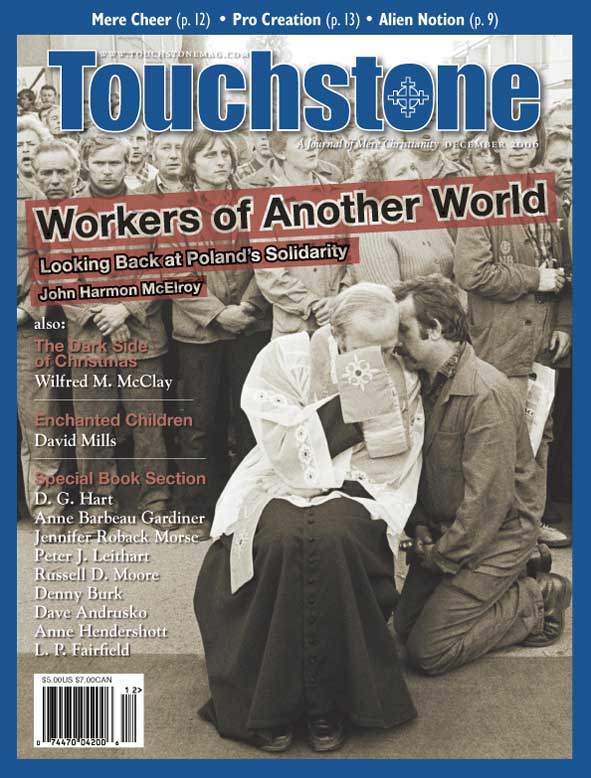Book Returns
Alien Notion
John Gray's Men Are from Mars, Women Are from Venus
by Louis Markos
In 1992, there appeared in bookstalls all over America an indifferently written and unashamedly trendy addition to the ever-expanding genre of self-help. Men Are from Mars, Women Are from Venus: A Practical Guide for Improving Communication and Getting What You Want in Your Relationships, written by a California-based therapist named John Gray, actually offers excellent advice on how to improve communication between husbands and wives, but the relevance of his work does not rest primarily in the practical sphere.
What earns this book a rank among those that have exerted a strong and lasting influence on modern American culture is its fearless and unapologetic assertion that there exist real and essential differences between men and women. It is a reality many Americans, astoundingly, refuse to see.
Insidious Sentence
If I were asked to select the single sentence from the writings of the founders of modern secular humanism that exerted the most baneful influence on twentieth-century thought, it would have to be this seemingly innocuous line from the “Author’s Preface” to Karl Marx’s A Contribution to the Critique of Political Economy: “It is not the consciousness of men that determines their existence, but, on the contrary, their social existence determines their consciousness.”
In Marx’s anti-humanistic vision of history, man neither makes nor shapes his world, but is a product of material, economic processes over which he has no control. Those processes not only determine what man does but who he is; they not only shape his creations but his consciousness as well.
This belief lies behind one of the most destructive aspects of egalitarian feminism. If consciousness is neither innate nor God-given but a product of socio-economic forces, the feminist argues, we must reject the archaic, non-critical, and oppressive notion that men are born with something called masculinity and women with something called femininity.
This feminism would have us believe that the only reason men and women are different is because of the different expectations that society has traditionally placed upon them: because we give boys trucks to play with and girls dolls to play with. They seek not to exalt femininity over masculinity but to eliminate both. Their final goal is a transformation in consciousness that would eliminate the categories of masculine and feminine and make “gender” a personal choice. In a word, androgyny.
And that brings us back to John Gray. Despite the fact that any parent who has raised both a boy and a girl knows by observation and experience that there are innate differences between males and females, the last few decades have seen a steady rise in the number of people who believe that masculinity and femininity are merely social constructs and that no real, essential differences exist between the sexes.
Indeed, most of those in the public square have long since kowtowed to the feminist insistence that the word sex (which suggests an integral link between men and women and their physical bodies) be replaced by the word gender (a jargon word, borrowed from linguistics, meant to break down, or at least obscure, the link between body and soul, the physical and the psychological).
Although Gray carefully avoids any direct confrontation with feminism and its denial of essential masculinity and femininity, every section of his book drives home the abundantly clear fact that the differences between men and women are innate, transcending both time and culture. As he admits in his introduction: “Not only do men and women communicate differently but they think, feel, perceive, react, respond, love, need, and appreciate differently. They almost seem to be from different planets, speaking different languages and needing different nourishment.”
Waves & Rubber Bands
A couple sits down to dinner, and the wife immediately begins to unload on her husband the troubles of her day. The husband listens carefully for a few moments and then offers his wife clear and concise advice on how best to extricate herself from the trouble that she is in. After he is done, he silently applauds himself for his problem-solving skills and for being such a good and helpful husband.
But the next night at dinner, his wife recites the same litany of woes. She has neither implemented her husband’s advice nor, it seems, even recalled it. The husband feels slighted and taken for granted and sees no reason to listen again to problems for which he has already offered airtight solutions.
What he does not realize (because he is from Mars rather than Venus) is that his wife was not looking for (rational) advice; she wished merely to get her (emotional) frustrations off her chest. What she hoped to receive in turn from her husband was not a “quick fix” but an understanding and sympathetic ear.
After laying out several more scenarios, Gray then explores the very different ways in which men and women deal with stress and relate to the world around them. Husbands, and men in general, he says, are like rubber bands that are able to stretch outward toward their wives with passion and intimacy.
But sooner or later, the rubber band goes slack, and the man runs for cover. He retreats into what Gray calls his cave, where he can cut himself off temporarily from the emotional demands of intimacy. If left alone, he will eventually begin to stretch outward again and leave his cave.
Too often, however, he is not left alone. His Venusian wife, misunderstanding his Martian need to spend time in his cave and misinterpreting his retreat as a rejection of her, counters by pressing a load of intimacy on him at the very moment he is most unwilling (and unable) to receive it.
Women, on the other hand, are like waves. At one moment a woman will be filled with love and praise for her husband and positive about their life together. At the next, she will suddenly fall into an emotional well and speak in hyperbolic terms about how terrible her life is and how tired and worn out she feels.
In response, her husband feels rejected and attempts to talk her out of her depression. But the wife does not need or desire to have her emotional stress explained away rationally. What she needs is simply to be held and understood and validated.
And that leads us to the center of Gray’s book, his countercultural claim that men and women not only communicate and process information differently; they have radically different primary needs that control and regulate the way they react to others, especially their spouses. Whereas women need to receive caring, understanding, respect, devotion, validation, and reassurance, men need to receive trust, acceptance, appreciation, admiration, approval, and encouragement.
Deny a wife her sex-specific needs and she will grow increasingly stressed and depressed; deny a husband his and he will become withdrawn and callous. Both will feel, in their own Venusian/Martian way, taken for granted: she misunderstood; he unappreciated.
Radical Differences
Gray stops short of saying explicitly that the different emotional needs of men and women are innate and essential. Nevertheless, his decision to label the twelve needs listed above as “primary,” and his frequent use of phrases that suggest that these primary needs are hardwired into us (“A woman thrives when she feels adored and special”; “Deep inside, every man wants be his woman’s hero or knight in shining armor”) leads the reader to the inevitable conclusion that our differing needs cannot merely be the products of socio-economic forces and material processes.
Indeed, Gray makes a statement in his introduction that turns Marx’s insidious sentence on its head. “Many men have denied some of their masculine attributes in order to become more loving and nurturing. Likewise many women have denied some of their feminine attributes in order to earn a living in a work force that rewards masculine attributes.” Our masculine/feminine attributes, that is to say, are not social constructs; rather, changing social pressures cause us to consciously alter attributes that already exist within us from birth.
Gray’s book was an immediate bestseller and spawned numerous sequels. It also won Gray considerable enmity from critics who saw him as advancing an “essentialist” understanding of sexual difference that social scientists had conclusively disproved.
“Men Are from Earth, and So Are Women. It’s Faulty Research That Sets Them Apart” ran the title of a critique in The Chronicle of Higher Education, and another in the SIECUS Report said that Gray’s book offered “‘silver bullet’ solutions to complex problems” and a “simplistic” but “insidious” analysis that offers “a prescriptive manual utilizing ‘differences’ to perpetuate essentialist notions of gender.”
Academics in the social sciences were particularly critical of Gray’s methods, which are, admittedly, anecdotal rather than sociological. He does not base his findings on peer-reviewed, double-blind scientific studies, but on seminars he conducted with thousands of couples from across the country. He trusts more to observation, insight, and common sense than to experimentation and statistics.
In response, millions of people around the world have embraced his findings, not on “scientific” grounds, but because they recognized themselves in his anecdotes. He offers us a norm, a center for understanding our masculinity and femininity. Academia, in contrast, has spent much of the last century taking that which is marginal and even aberrant and making it into a new norm, a new center.
For too long now, men in denial of their masculinity and women in flight from their femininity have been allowed to question, to decry, and even to tamper with one of the most important aspects of our God-given consciousness: our uniquely masculine and feminine natures. John Gray deserves our thanks and praise for helping to reverse this process by waking us up to a truth and a reality that we all know but many seem, somehow, to have forgotten.
The Mystery
It is hard to conceive that the complexity and integrity of our uniquely masculine and feminine natures as Gray describes them could have been evolved by blind and impersonal forces alone. Though Men Are from Mars, Women Are from Venus totally lacks any religious reference or reflection, the hand of a maker is evident everywhere in Gray’s careful analysis of the distinct but complementary needs that draw men and women together into the bond of marriage.
If Gray had written his book from a Christian worldview, he would not have needed to invent his myth of Martians and Venusians cohabiting the planet earth. Scripture would have supplied the explanation for what his study and work as a psychologist have shown him.
The creation of the helpmeet Eve out of Adam’s side and God’s proclamation that the two would merge, through the marriage covenant, into one flesh would have supplied him with a firm origin both for our distinctiveness and for our complementarity. Some reflection on the Bible’s promise (Rev. 21–22) that all of human history will culminate in a Great Marriage between Christ the Bridegroom and his Bride the Church might have suggested as well that the reality of complementarity will persist into eternity.
Furthermore, he could have grounded his discussion of the primary female need for caring and devotion and the primary male need for trust and admiration in two verses from the New Testament: Peter’s exhortation that the husband must treat his wife with honor as a weaker vessel (1 Peter 3:7), and Paul’s exhortation that the wife must see to it that she respects her husband (Eph. 5:33). Finally, he could have shown that only when the husband truly loves and the wife truly submits (as Eph. 5:22–33 and Col. 3:18–19 command them to) will the wife feel fully validated and the husband fully approved.
And he might have seen something else as well, a mystery that only Christianity—with its central teaching that a human being is neither a spirit trapped in a body nor a physical package wrapped around a spiritual core, but a perfect fusion of the two—could have taught him: namely, that it is not just our bodies but also our souls that are masculine and feminine. •
Louis Markos , Professor in English and Scholar in Residence at Houston Baptist University, holds the Robert H. Ray Chair in Humanities. His 19 books include Lewis Agonistes; Restoring Beauty: The Good, the True, and the Beautiful in the Writings of C. S. Lewis; On the Shoulders of Hobbits: The Road to Virtue with Tolkien and Lewis; and From A to Z to Narnia with C. S. Lewis.
subscription options
Order
Print/Online Subscription

Get six issues (one year) of Touchstone PLUS full online access including pdf downloads for only $39.95. That's only $3.34 per month!
Order
Online Only
Subscription

Get a one-year full-access subscription to the Touchstone online archives for only $19.95. That's only $1.66 per month!
bulk subscriptions
Order Touchstone subscriptions in bulk and save $10 per sub! Each subscription includes 6 issues of Touchstone plus full online access to touchstonemag.com—including archives, videos, and pdf downloads of recent issues for only $29.95 each! Great for churches or study groups.
Transactions will be processed on a secure server.
more on family from the online archives
more from the online archives
calling all readers
Please Donate
"There are magazines worth reading but few worth saving . . . Touchstone is just such a magazine."
—Alice von Hildebrand
"Here we do not concede one square millimeter of territory to falsehood, folly, contemporary sentimentality, or fashion. We speak the truth, and let God be our judge. . . . Touchstone is the one committedly Christian conservative journal."
—Anthony Esolen, Touchstone senior editor













